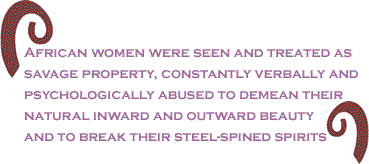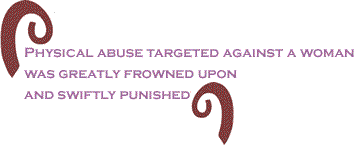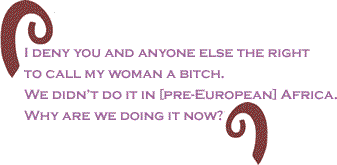
|
|||||||||||||||||||||
|
The current issue is always free to all readers If
you need the access available to a |
|
 |
|
During Mother’s Day week, the world’s one billion plus African (Black) people realize that they have at least one thing in common. If nothing else, they all recognize the fact that the worse thing that anyone could ever do is to say or do something bad about or to their “Momma.” Nothing seems to spark a greater amount of heated words, raised fists, and violent outbursts, great and small, as that. And why? It is because everyone understands that any and all attacks on the womb that carried you and then gave birth to you and took the best care possible of you is both an attack on the child-bearer and the child or children that it bore. In short, whenever a woman, most especially an African (Black) woman, is attacked - verbally or nonverbally, physically or mentally, spiritually or morally - not only is she attacked but so are all the people - past, present, and future - to whom she gave life through her sacred womb. For years, the very highly-esteemed and aged (80+ years old), African (Black/Ethiopian) Egyptologist and scholar-activist Dr. Yosef Ben-Jochanan (“Doc Ben” as he is affectionately known), has spoken and written about this in his countless lectures and twenty or more books. Yet, it seems that all too many people within the one billion-plus member African World Family have turned a deaf ear to his wise words and a blind eye to his long-lived logic. And just what has been the result? Isn’t it obvious? African women the world over constantly find themselves being the unwarranted victims of a centuries-old, unbridled, double-barreled, fully-throttled, frontal assault on their bodies and their minds, their souls and their overall moral character. Despite what many are led to believe by the mass media (or is it the “mess media”?) this barbaric assault on African or Black women around the globe did not start in the recent past with either godless gangsta rap or soulless shock jocks, but in the distant past. At the same time, the life span of such assaults, historically, is much shorter than the period of time before little, if any, such assaults took root in the hearts of mortal and evil men and manifested itself in all its violent and visible colors and in the form of seemingly countless harmful and often deadly deeds. In short, it stems primarily from two of human history’s greatest, if not its greatest, crimes - each one feeding venomously on the others. The first is the 500 year-old, European-led African slave trade that stole at least 10 million of Africa’s brightest, youngest, and best people, resulting in the slaughter of between an estimated 100 and 600 million Africans in the cold-hearted pursuit of causing the cup-like coffers of Europe to runneth over with blood diamonds and other blood-covered riches. The second is the rarely-mentioned (except for Doc Ben and Dr. Clarke, mostly), Arab-led, African slave trade that preceded the European one by over 1000 years, wrecking virtually irreparable damage on Africa and countless Africans, looting its wealth and its people, and making it much easier for the Europeans to enter Mother Africa centuries later, the world’s richest continent, and enslave her people. During both of these long-lived but rarely fully- and honestly-discussed historical horrors, African women were seen and treated as savage property, constantly verbally and psychologically abused to demean their natural inward and outward beauty and to break their steel-spined spirits. They were physically beaten (even when pregnant), raped, mutilated ( teeth knocked out and breasts cut off) and sold wholesale with impunity. They were even forced to be “breeders” of many children (with the most fertile ones having the most value. Does that sound familiar, maybe like welfare?) by their respective slave owners. In all too many cases, the children they birthed were almost immediately snatched from their loving arms and sold or given as gifts, as if they were cattle, to other would-be slave owners. And that’s just the tip of the iceberg of the untold and unwarranted suffering that African women have received at the hands of others - those outside their race, which, over time, greatly deformed the typically respectful treatment they ordinarily received at the hands of the men of their own race. That, of course, by no means justifies such dastardly acts against any woman, especially African (Black) women, no matter who does them, including their own men.
What is interesting, of course, is the tremendously, irremovable and irreplaceable mark that African women have left on both Europe and Asia in particular, and the world as a whole, by birthing some of its greatest personalities, like the enormously brave and much-celebrated French general Alexandre Dumas, whose Mom was a Black Haitian woman and whose son, Alexandre Dumas, went on to write the world-famous novels, The Three Musketeers, The Count of Monte Cristo, The Man in the Iron Mask and The Corsican Brothers. This last is a newly-republished 1840s novel about anti-African/Black racism in France and its colonies and its Afro-/Black French character's dogged determination to seek revenge against those who wronged him. No, I assure you that I am not drinking, smoking, injecting, or inhaling. My comments are purely steeped in solid historical records. And just what do those records, past and present, “say”? Along with hardcore archaeological and anthropological evidence and solid, scientifically-proven DNA research, they say, even shout, decisively, wholeheartedly or not, that the first woman on earth, the mother of all people (past, present, and future), and the “Mother of Civilization” were all one and the same - an African or Black woman. No, don’t pass out. And don’t stop reading. As all those things stated above, the African woman, while the African man hunted and gathered food during humanity’s early existence, developed, among other things, two major human necessities - agriculture and chemistry, both in the form of cooking and creating make-up. She also, according to some anthropologists, was the first to create clothes. Virtually light years before the phrase was ever thought, written, or uttered, it was recognized, then in the ancient African world, more so than now, by the power of women, especially mothers, that “the hand that rocks the cradle [gives birth to and raises children], is truly the hand that rules [controls, dominates, etc.] the world.” And physical abuse targeted against a woman was greatly frowned upon and swiftly punished. For women, as a whole, are not only child bearers but also culture carriers. They, first and foremost, in all too many ways, pass on the culture and traditions of their people. Consider Moses’ mother and even your own. Such noted African historians as Dr. Ivan Van Sertima, have pointed out that a woman’s lap, in ancient times, was often called “a throne”. And just think how often, as children, brothers and sisters, that sacred “throne” has gently rocked us to sleep. It still does so for many adults. But that’s another story. Speaking of stories, those of loving and kind, unselfish and strong, brainy and brave African women abound in many hearts and minds and throughout honest writings and discussions about history, although in very few newspapers and magazines, books and movies, or videos or song lyrics and other forms of the mass media. Instead, African and other people with whom they share the earth are daily force-fed the worst of the worst images of African women and little, if any, of the truthful opposite. Typically, African women are shown as “welfare queens” and “drama queens”, as ruthless gold diggers or shamelessly, immoral drug or sex addicts or partners (prostitutes, strippers, etc.), as loud- and foul-mouthed, brainless beings or as bootyrump-shaking, non-thinking, mothers of multiple children by multiple daddies, as vicious and vindictive, as uncaring and un-sharing, as the inseparable friend and bed partner of the white man and the eternal enemy and betrayer and competition of the Black man, or as completely neutered females (as “Mammys” not “Mommies”) who serve no other purpose than to take care of non-African children and their families while totally and shamelessly abandoning their own.
These soul-stirring, heart-wrenching, and mind-crippling deadly, false images splash themselves across the printed page and the computer, television, and movie screens, and billboards near and far. They influence both how and what the world’s African people feel and say about and do to themselves and both how and what others, especially white and yellow and brown supremacists, feel and say about and do to them. Well, if those images are false, you may ask, what, then, is the truth? The truth is that, yes, unfortunately, there are African or Black women who easily fit those horrible descriptions above. And the same can easily be said, for the most part, about the women of any and all other ethnic and/or racial groups that live on earth. But none of those other groups has ever undergone the non-stop, unbridled attacks on every aspect of their being as African women and, of course, African people as a whole, have. The overall historical truth is this. Not only are African (Black) women the Mothers of all humanity and human civilization, but from time immemorial they have served in a vast variety of interesting roles. Some have walked the earth as warrior-queens, like the Candace queens, one who was mentioned in the New Testament and the other who gave the world-famous Alexander the Great a major military defeat and warrior-queens like Nzinga of Angola, who bravely and boldly, until her death in her 80s, waged armed warfare against the Portuguese who had invaded her land, disrespected her person, and tried to enslave her people. Others have been wise and beautiful; queens like Makeda or the Queen of Sheba, who King Solomon of Israel, fell in love with and had a son by according to the sacred Ethiopian text The Kebra Nagast, and Pharaoh Hatshepshut and blue-Black Queen Nefertari and equally Black afroed Queen Ti, the Mother of Akhenaton and King Tut, of Egypt. Other historically important African women have been world-famous writers, like the Greek (nationality) poetess Sappho from the island of Lesbos, the source of the word “lesbian” although she may not have been one. Some have had famous tracts of land named after them and/or owned the same, such as the Black queen Califia, from whose name comes the word “California”, reportedly meaning the “land where Black women live” and property owners, like Maria Rita Valdez, who once owned Rancho Rodeo de las Aguas (roughly,“the ranch road of the waters”), commonly known as “Beverly Hills” in California. Other noteworthy African women have been dressmakers and confidants for presidents, first ladies, like Elizabeth Keckley for Abraham Lincoln’s wife Mary Todd Lincoln, and Ann Lowe, who made the wedding dress that Jacqueline Bouvier wore when she married a young John F. Kennedy. Then, of course, there are other sisters worthy of note. They include Harriet Tubman, the legendary, runaway slave and Underground Railroad conductor, who was one of the last women to led an army into battle during the American Civil War, the fearless, fighting, female warrior Yaa Asantewaa of Ghana, West Africa, who gave a much-needed pep talk to raise the fighting spirit of her Asante people’s male warriors, who bravely, along with her, waged unceasing war against the British who had invaded her land and slaughtered many of her people in the late 19th and early 20th century until she was eventually imprisoned and exiled by Britain. Theb there are the countless and unknown African American women who, mostly unwillingly and without anesthesia, were experimented on by an otherwise life-long and professional failure named Marion Sims, who later became known as the “father of American gynecology”; Henrietta Lacks, whose cells (the He-La cells) have not only been used by, and have reaped untold millions for, the medical profession without her family’s permission and without it profiting virtually at all from it, but whose cells, due to their amazingly, speedy, duplicating ability, have been used all around the world to seek cures for various diseases, including polio.
No truly honest discussion of noteworthy African (Black) women would be complete without naming the fearless and brainy sisters like Mississippi’s Fannie Lou Hamer, who was not only sterilized in her home state without her permission but also beaten from head to toe with a rubber pipe because she choose to stand up for her rights and the rights of African people in Mississippi and around the country and world, and Ella Baker, a truly unsung heroine who served as one of the co-founders of Dr. Martin Luther King, Jr.’s famous, basically all-male, Black Baptist preacher-dominated group, the Southern Christian Leadership Conference (SCLC) and a co-founder of the Student Non-Violent Coordinating Committee (SNCC), which gave “birth” to the likes of Stokley Carmichael (the late Kwame Toure, known for his often quoted words “Black Power”), among other civil and human rights-oriented groups. Amy Jacque Garvey, the strong-willed wife of the Honorable Marcus Garvey, the leader of the largest Black mass movement in the world - bigger than Dr. King’s or Malcolm X’s and others combined - kept her husband’s powerful legacy alive while he served time on trumped-up charges in an Atlanta penitentiary and long after his death in 1940. Then there is my extremely bow-legged, Bible-toting, pistol-packing, straight-talking, no nonsense but loving and caring great grandma, Sylvia Thomas, my equally loving and carrying, sharing and self-sacrificing, past and present Civil Rights activist Mother, Myrna Jackson, and countless other worthy sisters - be they little-known, well-known, or virtually unknown. Let’s not forget the Afro-German Queen Charlotte Sophia, who was both the wife of King George III, the king of England at the time that the 13 English colonies waged war against Great Britain during the American Revolution, and who Charlotte, North Carolina is named after. She is also a distant ancestor of the current queen of England, Queen Elizabeth II, who recently visited the United States and the White House. Let’s not forget Isis, the African from whom we derive the name for the world-famous “city of lights”, France’s Paris. Nor let us forget the fact that all over Europe, if not the world, there are over 300 depictions (paintings, statues, statuettes, etc.),hundreds of years old, that show a clearly jet Black-faced and –bodied Mary, Mother of Jesus, and baby Jesus. Collectively, they are called “Black Madonnas” and are still highly-esteemed in such countries as Spain and Poland, as well as Germany at one time, according to the world-famous and incomparable, globetrotting, Black historian and photojournalist J. A. Rogers. In short, despite the blistering winds of disrespect that blow against you, the hailstorm of unwarranted destructive criticism that rains down upon you, and the thunder and lightning that spews from jealous mouths and minds and even more jealous hearts, directly at you, stay strong, sisters. Stay strong because that’s what you historically and naturally do, sisters. Stay strong because those, both within and outside of the African World Community, who wage needless and ceaseless war against you, truly hate themselves more so than they hate you; it is that same hate that will eventually consume them. Stay strong, sisters, because some of the very same people who shot venom at the many different shades of your skin, the size of your lips and hips, the style of your hair, and the uniqueness of your talk and walk, your overall shape from head to toe, and the unmatched natural intelligence that you were born with, constantly find themselves doing strange things to themselves to look and act just like you. They go from baking in the sun to squeezing into bustles, from injecting fat into their lips lips and hips to wearing lip stick to emphasize their lips' almost invisible size, from corn-rowing to plaiting and from “blowing” out to dread-locking their hair to even having changes made to their behinds or the clothes that cling to them, such as the recently-created female blue jeans, that make it seem as if people born without a “behind” actually have one and a perfectly, symmetrical, African-appled one at that.
Now please don’t take offense. I mention the above either to inform or remind you and all readers that our world is full of such contradictions - ones where those who hate others usually do so because they truly are jealous of and have a deep-rooted desire to be exactly like the targets of their hate. I also do so because, as I have already said, I want you to stay strong, sisters, and to direct our young sisters down the right path to being respectful, responsible, and dependable. Remember, to paraphrase the Old Testament book of Psalms, the stone that the builders refused [often] becomes the head of the corner. And to all too many people, sisters, you are that refused “stone”. Brothers, for our part, let us lift the sisters up. That doesn’t mean that we will agree with them all the time nor will they always agree with us. But, as Malcolm X once said, we can, as we used to do in our homes in the Black community, sit down and settle our differences behind closed doors without striking blows and live in the house in as harmonious a way as is humanly possible. Let us keep in mind that, according to age-old African philosophy concerning the “theory of opposites”, as Doc Ben and his late scholar-activist friend, Dr. John Henrik Clarke, have pointed out repeatedly, “For every up, there’s a down; for every in, there’s an out; and, for every god [or male, if you will], there is a goddess [or female].” In short, ancient and many current Africans believed that man could never be whole without woman and woman could never be whole without man. As Dr. Clarke once put it, “Woman is not the better half but the other half.” As I like to say, it took two, man and woman, to get us here and it will take the two to keep us here and make our world better by working together. Finally, that brings me to these thoughts. One comes from the Afro-/Black Arab hero Antar, who lived over 1000 years ago in Arabia, is called the “father of knighthood [and] chivalry” (with more proof that he lived than the legendary, European King Arthur), and whose poem is one of the few in gold letters that once hung in the temple at Mecca. Wrote Antar over 10 centuries ago, “Every man defends his woman, whether she be Black or white, whether she be smooth or hairy.” Brothers, let us protect, respect, and not reject the sisters, African women, near and far, young and old, rich and poor, etc. Let us rain down on them all the respect that they are rightfully due, genuinely applauding them when they are right and lovingly correcting them when they are wrong. And, sisters, if I may humbly speak for the Brothers, all the world’s African men, for a moment, we ask the same of you regarding us. At the same time, I truly believe that it is helpful to highlight a somewhat heated but truly interesting exchange between the late, world-renown, African American historian Dr. John Henrik Clarke and an antagonizing questioner during a question and answer session years ago. Attempting to anger Clarke by rephrasing questions that would suggest that white men are superior to Black men regarding how each treats its woman, the questioner arrogantly asked, “Well, doesn’t the white man protect his woman better than the Black man?” Immediately, Clarke snapped back with, “Hell no and a lot less.” He went on to say, “The white man protects his woman a lot less [than the Black man].” He explained that such is true because, “His [the white man’s] institutions protect his lack of protection….He has the television…the radio…the newspapers to cover it up.” Then Clarke went on to point out how “In every city in this country prostitution is a major industry. And the Black woman is in the minor leagues in that business,” strongly suggesting that virtually the most sought after and greatly used prostitutes or “working girls”, especially high-priced and highly-educated call girls, are not Black but white. Knowing that, is anyone going to shout out “kinky-headed h-s”? I doubt and don’t even suggest it. But it is interesting, as the famed Black journalist George Curry pointed out recently, that the late Anna Nicole Smith, who, reportedly, slept with many men and/or others, and, who for the longest time, left many doubts as to who the father of her baby was, was never once, as far was we know, called a “ho”. That’s interesting. Despite that, as Clarke once said at an historically Black college during a question and answer period discussion about gangsta rap, “I don’t think that we [the world’s one billion plus African people] have to go through gangsta rap to get to revolutionary [mind- and spirit-uplifting] rap.” Then he ended the discussion on the topic by saying, “I deny you and anyone else the right to call my woman a bitch. We didn’t do it in [pre-European] Africa. Why are we doing it now?”
What may be even more interesting are the following words that come from one of the African World Family’s many but most important unsung heroes. That is none other than the late, Black, Caribbean-born, Harlem-based, street corner speaker and multi-genius Hubert Henry Harrison or “the Black Socrates” as the late, world-famous, Black historian and scholar-activist John G. Jackson, who knew and wrote about him, called him. In his must-read, recently republished, 1920 book, *When Africa Awakes: The "Inside Story" of the Stirrings and Strivings of the New Negro in the Western World, Harrison, who influenced the likes of the Honorable Marcus Garvey and W. E. B. Du Bois, who he strongly criticized, wrote an essay entitled, The Women of Our Race. In the essay, he wrote these words:
Finally, says, Harrison, speaking to all Black men,
I don’t know about you, brothers, but I give a thunderous “yes” answer to all of the above. In short, happy Mother’s Day to all the world’s African(Black) mothers. Keep your heads up, your hearts pumping endlessly with love, your caring words of wisdom and the rightful hand of correction at the ready to properly and positively strengthen, correct, and guide us, your children, when we need it the most. Don’t spare the rod when it should be used. And, please don’t use it, when it can be spared. I just thought I’d throw that in for good measure.
Stay strong, my African (Black) sisters, mothers or not. Do so by preserving, protecting, presenting and promoting the very best of all your many often imitated but never truly duplicated qualities - your inward and outward beauty, your godly, loving and caring ways, your sharp wit and intellect, your indomitable spirit, your graceful walk, your soul-stirring talk, and your eye-catching, mind-grabbing, heart-warming soul-stirring style. Please preserve and promote the timeless culture and history of your people, the world’s first and oldest. And respect your own and other people’s sons, knowing, hopefully, that you would not want your son or father or that of someone else's, to be disrespected and mistreated. And, my African (Black) brothers, yes, most definitely, let us do our parts. Let us not disrespect or mistreat our own or anybody else’s daughter, knowing how upset we would become if someone mistreated the person who many of us consider to be one of the most important persons, if not the most important person, in our lives, our mothers, who is somebody’s daughter. Let’s speak warmly to the sisters instead of trying to physically beat the sisters. Let’s hold the doors open for the sisters and not knock to the floor the sisters. Let’s say good things to and about the sisters or simply nothing at all to the sisters even when their constantly disrespectful behavior and lack of self-control may decidedly lead one to believe that they are unworthy of such respect. When you come across such sisters like that, take Dionne Warwick’s advice and just “walk on by”. But, with all women, African (Black) women most especially, when it comes to how to treat them “always and forever”, take the ol’ school, soul balladeer Otis Redding’s timeless advice, and “Try a little tenderness.” We and the sisters can’t lose if it’s that kind of stuff that we use on and toward each other. Peace! BC Columnist HAWK (J. D. Jackson) is a priest, poet, journalist, historian, African-centered lecturer, middle school teacher and part-time university history instructor. Click here to contact HAWK. |
|
| Home | |
| May
17, 2007 Issue 230 |
||||||||||||||
|
||||||||||||||
| Printer Friendly Version in resizeable plain text format | ||||||||||||||
|
|
||||||||||||||
 |
||||||||||||||
 |
||||||||||||||
 |
||||||||||||||
| |
||||||||||||||
| |
||||||||||||||







































